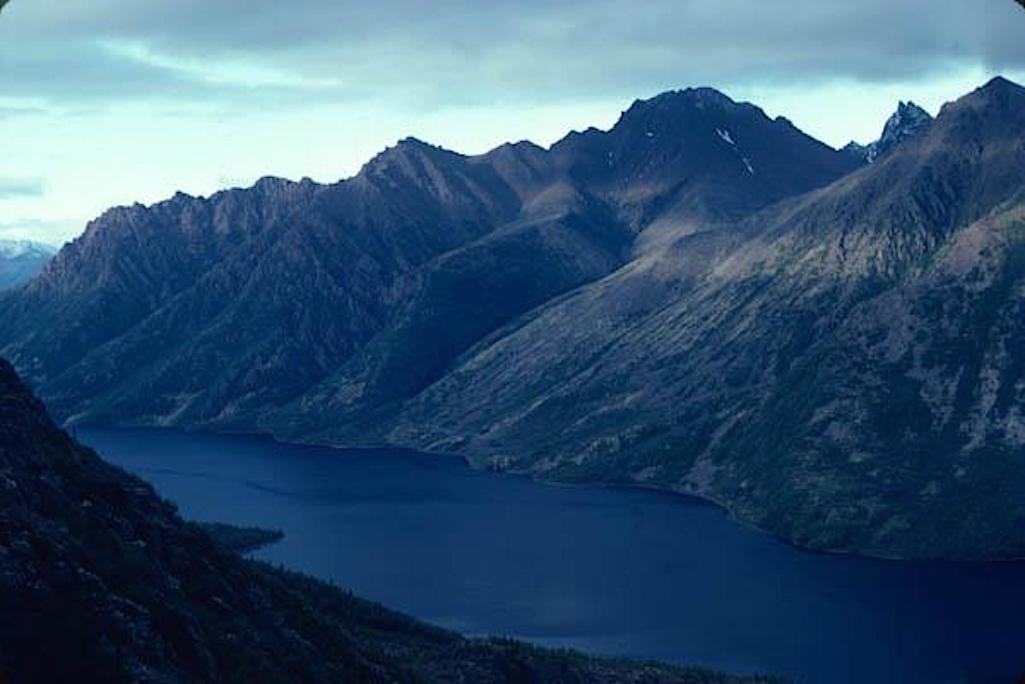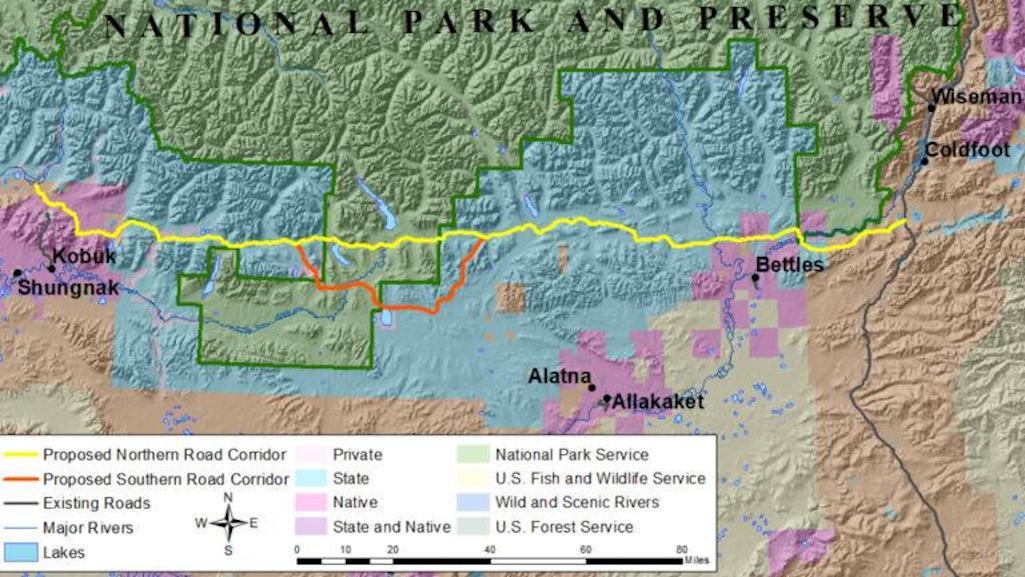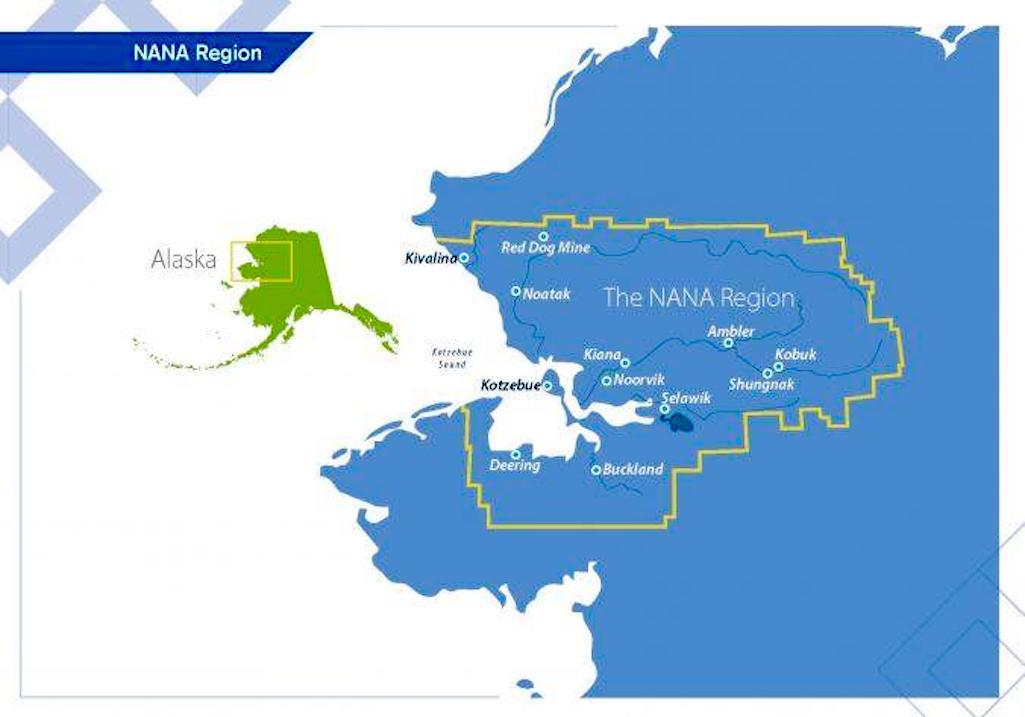
Narvak Lake headwaters of Kobuk River Gates of Arctic National Park/George Wuerthner
Essay | Update On Ambler Road In Alaska’s Brooks Range
By George Wuerthner
While much conservation and political attention have focused on whether to allow oil development in the Arctic National Wildlife Refuge, another project, the Ambler Mining Project and road construction proposal, may pose even greater threats to the Arctic’s wildlife and wildlands. Despite this threat, the Ambler project has thus far received far less attention from the media, politicians, and conservation organizations.
The proposed 211-mile Ambler Road would connect the Dalton Highway (pipeline haul road) with the Ambler Mining District in the western Brooks Range. The ore belt that stretches for 200 miles contains copper, cobalt, lead, and zinc and could be one of the most valuable deposits in the world, especially as people turn to electric vehicles.
There is new interest in encouraging the U.S. development of critical minerals and energy, and the Ambler Mining proposal benefits from this push for US sources of minerals.
Although these deposits have been well-known for decades, the cost of mining, smelting, and transportation has precluded development. (I knew about the ore deposits in the 1970s when I lived and worked along the Kobuk River).
Years ago, I taught a class on Alaskan Environmental Politics. I emphasized that Alaska has more oil, coal, minerals, and even forests than most other parts of the United States. Many of these resources remain undeveloped because of the harsh climate, remote locations, and lack of access.
There are, for instance, substantial forest resources in Southeast Alaska. Still, they cannot be cut and transported without government subsidies because it’s cheaper to log trees in Oregon or Washington.

The proposed road would cross the Gates of the Arctic NP (green), state lands (blue), and native lands (pink)/NPS
In the case of the Ambler mines, NANA shareholders are likely to be employed during road construction and mining operations.
One study estimates that 20% of all construction jobs will be held by local villagers, providing significant money input into these rural villages. NANA corporate leaders likely believe they are working in the best interests of their constituency.
In addition to NANA and some residents who would benefit from jobs and royalty payments, the road is also supported by the state of Alaska. The Alaska Industrial Development and Export Authority (AIDEA) would own Ambler Road.
Alaska’s Congressional delegation has supported the road and mining proposal. Rep. Mary Peltrola, a Democrat, has also joined her Republican counterparts in the Senate to support oil development in the Naval Petroleum Reserve.
The road, if built, would likely lead to road sprawl and the expansion of development in the region, including perhaps oil development in the Naval Petroleum Reserve to the north of the Brooks Range.
Although the road supporters point out that the road would be a private road only accessible to industrial use, opponents point out that the same claim was made about the Pipeline Haul Road. However, in 1994 the state opened the Pipeline Road (Dalton Highway) for unrestricted, public use.
Opposition to the road comes from Tanana Chiefs and other Athabascan Indians living along the Koyukuk River and tributaries. The Athabascan would gain no advantage to a road except perhaps for more accessible and cheaper shipment of supplies. But they fear the road would disrupt subsistence hunting and gathering.

Yellow line shows the area of NW Alaska that NANA Corporation represents.
The Athabascans are not necessarily opposed to mining or oil development themselves. Doyon Native Corporation, which represents the Athabascan people of the Yukon Basin, during the land selection process of the Alaskan Native Claims Settlement Act has specifically targeted mineralized lands. Today, they have several active mining operations.
Doyon also has ongoing oil and gas development.
So, in essence, the road is pitting one ethnic native group against another.
In addition to opposition from some native people, many conservationists also oppose the road. The Ambler Road, if built, would cross the Gates of the Arctic National Park and Preserve and numerous other protected areas like the Kobuk Wild and Scenic River.
The National Park Service did an excellent review of the potential impacts of the road on wetlands, water quality, fish, wildlife, subsistence, and recreational impacts on the park that applies to the total road mileage.
Conservationists and native people opposed to the mine have produced a good video about how the road would impact the Arctic.
Roads can be semi-permeable barriers, and although crossing such obstacles is possible, caribou may shift or entirely abandon their seasonal habitat. The disturbance and activity along the road and mining operations are likely to affect caribou in other ways. Studies have shown that caribou may travel up to 9.3 miles to avoid roads and 11.2 miles to avoid settlements.
The Western Arctic caribou herd is already in steep decline.
For instance, a study of the Native-owned Red Dog Mine Industrial Access road north of Kotzebue found that just four vehicles an hour affected the migration of 30% of collared caribou, or approximately 72,000 individuals of the 2017 population estimates.
An environmental review by the BLM in 2020 found that the road would impact salmon, caribou, and other wildlife.

Caribou in the Brooks Range have been shown to avoid roads, and development of the Ambler Road may disrupt caribou migrations/George Wuerthner
Linear features like roads also are used by predators like wolves. This can increase predator influence on prey like caribou. Roads and seismic lines in Alberta have led to increased predation on woodland caribou.
It also does not take much imagination to see that this road will eventually be extended to the coast by Kotzebue, fragmenting the entire western Brooks Range’s ecosystems.
Nevertheless, the road’s construction was approved by the Trump administration. However, the Biden administration has ordered the Bureau of Land Management to reevaluate the environmental review on the project.
The BLM accepted comments until November 4. Whether the BLM review changes the decision to move forward with the road remains to be seen.
But my sources in Alaska say that the Biden administration is likely to approve the road to help Alaskan politicians, perhaps with stricter regulations designed to address environmental concerns. The Biden administration wants to oppose Petrola, who is a supporter of the mine road. Republican Sen. Lisa Murkowski, who is in a tough re-election battle, was critical to Democrats in voting to convict Donald Trump for his role in the January 6 insurrection, was one of three Republicans to vote for nomination of Judge Ketanji Brown Jackson and she was the only GOP member to support the Voting Rights Bill. Biden does not want to alienate her potential support for other Democratic agenda votes.
I can’t emphasize enough that this road is one of the biggest threats to the Arctic’s wildlands and wildlife. It is bigger than just the development impacts that may result from the Ambler Mining operations. I have no doubts that the road, if built, will eventually make other mineral and oil, and gas sources economically viable to develop.

 Support Essential Coverage of Essential Places
Support Essential Coverage of Essential Places




Comments
All the hand-ringing about the Alaska pipeline came to naught; many of the same arguments are regurgitated by the same crowd now.
The idea of "road sprawl" in northern Alaska is so ridiculous both Democrats and Republicans are for building the road.
Alaska is mind-numbingly immense. It's not a museum. Yeah, I want more recreational access. Build the road.
Good article.
Alaska exported over 15 million barrels of oil, most of it to China in 2020 and that number continues to grow. 730+ million dollars of zinc to Europe, Asia and Canada in 2020 and now we want to spend billions on a road to acess more. It will be the mining and oil executives that will benifit most from such an operation not you, I or the 20% of the native workers. I certainily believe in free enterprise but this smells of greed vs enviroment. Is it really needed? just saying...
John, how about the other 150 million barrels that Alaska produced and didn't export. Americans didn't benefit from that?
My point is that our country already produces enough oil to be independent but is still affected by the greed of the oil companies and a variety of situations that continue to create so called "shortages" that drive the price at the pumps. Oil is a political weapon and it doesn't need to be. Both parties agree to this road? Not so sure. I do not understand how someone can say that we must address climate change and then bulldoze their way through the wilderness to get more of what we already possess. What's the right thing to do? I'm just saying do our part and keep the wilderness wild.
John, we were energy independant. No more. We now are begging the Saudis and Venuzuelans for oil. I can assure you, they aren't worried about "wilderness". When the lights go out and trucks can't get their diesel, you will see those shortages aren't "so called".
https://www.forbes.com/sites/rrapier/2022/10/01/us-energy-independence-h...
Kurt, if we are energy independent why are we begging the Saudis and Venuzuelans for oil? Why are we draining the Strategic Oil Reserve while facing potential nuclear war with at least four countries? Those aren't actions of a nation that is energy independent.
Any increase in the production of oil, regardless of to whom it is sold, benefits ALL consumers of oil.
It does not matter if 10% or 90% of Alaska crude is sold to the Chinese. Oil is fungible and globally available, and if China or any other consumer need some, they are going to buy it wherever it can be found. The only question is the price. And that's where oil production comes into play. Simply BECAUSE Alaska produces oil, the price will reflect that. And the more Alaska (and other producers) produce oil, the lower the price--THAT benefits all of us who consume oil whether China or John.
It's not a matter of who BUYS oil (from Alaska or otherwise), it's a matter of how much is produced worldwide.